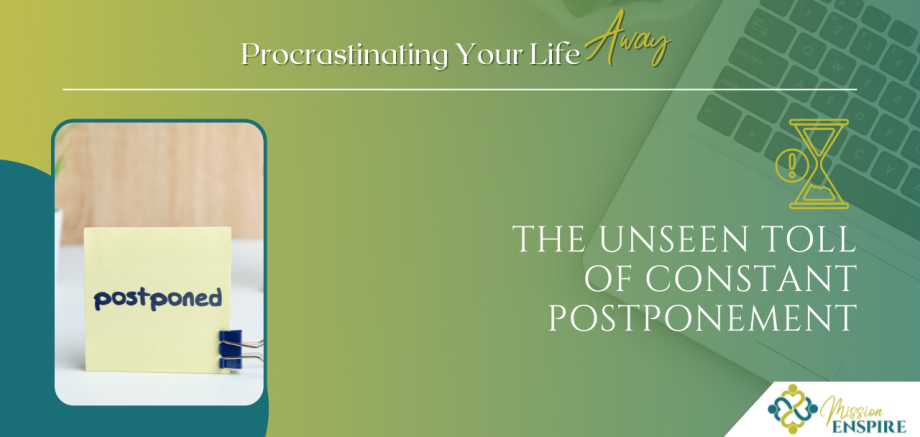Procrastination, that subtle habit of delaying tasks and responsibilities, often starts innocuously enough. We convince ourselves that we’ll get to it later, that it’s not a big deal, or that we work better under pressure. However, this seemingly harmless behavior can have profound and far-reaching consequences that quietly erode our productivity, well-being, and overall quality of life. Today, we are going to delve into the unseen toll of constant postponement, exploring the ripple effects that procrastination can have on various facets of our existence. From missed opportunities and heightened stress levels to a perpetual sense of dissatisfaction, the consequences of procrastination are more pervasive than we may realize.
The Procrastination Pandemic: You’re Not Alone, My Friends!
Who’s ready to get real honest for a hot second? Raise your hand if you’ve ever found yourself aimlessly scrolling social media instead of tackling that looming project deadline. Or maybe you’ve reorganized your entire sock drawer for the third time this week, all to avoid doing those dreaded dishes piling up in the sink? If that sounds like a scene ripped straight from your personal life movie, fear not – you’re definitely not alone in this struggle! In fact, did you know that at any given moment, roughly 20% of the population is actively procrastinating on some aspect of their lives? That’s 1 in 5 folks avoiding responsibilities left and right!
Even me! Let me share a personal anecdote. Recently, I had the opportunity to be featured in an article on BoldJourney.com – an exciting prospect! However, despite the initial enthusiasm, I found myself falling into the procrastination trap. A member of the editorial staff reached out to me in early January, and I promptly responded, eager to understand the process. Yet, despite being armed with the necessary information, I allowed the task to linger on my to-do list. Even after recovering from a brief illness within three weeks, I continued to postpone my part of the process for another six weeks, ultimately not submitting my contribution until April 1st. In retrospect, this delay was entirely avoidable, yet I succumbed to the allure of procrastination. The consequences, while not catastrophic, were nonetheless tangible. However, I did get back on the horse so to speak – and you can find the featured article right here.
So whether it’s students putting off studying for that big exam, employees delaying those pesky reports, or all of us conveniently “forgetting” about that towering mountain of laundry, procrastination is pretty much a universal experience. We’re all out here procrastinating something, on or off the clock, and let me tell you – admitting we have a problem is half the battle!
Procrastination: A Silent Saboteur
Let’s get one thing straight right off the bat – Procrastination isn’t just some pesky time management issue that can be solved by setting a few more phone alarms or downloading a fancy new productivity app. Nope, this bad habit runs way deeper than just hitting that enticing snooze button one too many times. The cold hard truth is that procrastination often stems from some pretty powerful internal forces. Maybe it’s a deep-seated fear of failure whispering doubts in our ears. Maybe it’s good old-fashioned lack of motivation or interest slowly chipping away at our drive. Or maybe – and this one’s a doozy – we simply don’t know where the heck to start, so we instinctively do…nothing at all.
Yep, procrastination is a complex little monster, my friends. A sly shape-shifter that can manifest as avoidance, distraction, or flat-out inaction, always luring us away from the tasks and goals that really matter. But here’s the good news: while procrastination might be one of humanity’s oldest shared vices, that doesn’t make it an inherently bad thing! Shocking, I know, but hear me out.
While many perceive procrastination as a mere personal habit, its impact extends far beyond the individual. This insidious behavior has the potential to undermine various aspects of our lives, silently eroding our relationships, productivity, and overall well-being. Here are two ways procrastination impacts our lives:
- Strained Relationships and Shattered Trust. Procrastination is not a solitary act; it often ripples outward, affecting those around us. When we fail to meet deadlines or commitments, it can strain our relationships with colleagues, friends, and family members. Trust is a fragile construct, and repeated instances of procrastination can shatter it, leaving us isolated and disconnected from the very people who matter most.
- Diminished Career Prospects and Financial Instability. In the professional realm, procrastination can be a career saboteur. For those employed, it can lead to missed opportunities, decreased productivity, and potentially, job loss. Entrepreneurs and self-employed individuals are not immune either; procrastination can hinder business growth, cost valuable clients, and impede essential decision-making processes, ultimately threatening financial stability.
Beneath the surface of procrastination often lie deep-seated beliefs and thought patterns that perpetuate this harmful behavior. Low self-esteem, fear of rejection, harsh self-criticism, and a preference for instant gratification are just a few of the underlying factors that can fuel the cycle of procrastination. Breaking free from procrastination’s grip requires a multi-faceted approach. It demands cultivating self-awareness, challenging negative thought patterns, and developing effective time management strategies. Only by addressing the root causes and implementing proactive measures can we reclaim control over our lives and forge a path towards fulfillment, both personally and professionally.
So, how can I go about changing things up?
The Anxiety-Procrastination Two-Step: Let’s Change the Tune
It usually goes something like this: Anxiety sweeps in and starts calling all the moves, fears of failure or the unknown or just plain old overwhelm making us want to avoid tasks altogether. Then procrastination sashays onto the dance floor, and before you know it, we’re falling deeper into procrastination’s trap. The kicker? That only breeds more anxiety about not getting things done! It’s a vicious cycle, a real emotional two-step from hell.
But you know what? We don’t have to be prisoners to this dance anymore. It’s time to cut in and change the tune! The first step is figuring out what’s really fueling your anxiety. Is the fear of messing up leading you astray? Are the great unknowns of life throwing you off balance? Or is it a severe case of the overwhelms making you want to hide under the covers?
Once you pinpoint your anxiety instigator, you can start putting some counter-moves into practice. If that looming fear of failure is your personal tormentor, try envisioning the worst-case scenario and game-planning some work-arounds. Boom, suddenly that monster in the closet doesn’t seem so scary, does it? For those of you struck by the anxiety of uncertainty (we’ve all been there!), remind yourself that literally no one knows what curveballs life will throw. But you’re not alone out there – you’ve got a whole cheerleading squad in your corner to lean on when the path gets rocky.
And if it’s overwhelm weighing you down, why not try breaking up those big, hairy tasks into bite-sized chunks? Yes, that mountain of obligations looks terrifying from the base…but if you just take it one step at a time, you’ll reach that summit before you know it. The point is, my friends, we all get tangled up in anxiety and procrastination’s twisted dance from time to time. But you’ve got all the moves to cut in and change the music whenever you need to. So shake it off, strut your stuff, and don’t let this dysfunctional duo stop your groove!
Break Free from Procrastination
Procrastination’s pervasive effects cast a long shadow over our lives, slowly eroding our potential, peace of mind, and quality of life. Its insidious tolls seep into our relationships, careers, and overall well-being, leaving us dissatisfied, stressed, and disconnected. However, shining a light on these hidden consequences is the first step towards positive change. Awareness sparks action, and each purposeful step to combat procrastination chips away at its grip.
But what if you find yourself stuck in procrastination’s vicious cycle, the anxiety and avoidance feeling impossible to overcome alone? Don’t lose heart, my friends – you don’t have to go it alone. This is where seeking professional support can be a game-changer. Whether it’s talking to a counselor or exploring mental health resources, an objective third party can provide invaluable tools and guidance to help you break through the barriers keeping you stuck.
From cognitive-behavioral techniques to manage anxiety and reframe negative thought patterns, to practical strategies for building productive habits, the right support system can illuminate a clear path forward. And let’s be real – investing in your mental well-being isn’t just a luxury, it’s an act of self-preservation in our fast-paced, high-stress world. So, if you’ve been wrestling with procrastination’s demons and can’t quite get a grip, I encourage you – no, I implore you – to explore the realm of mental health support. You’ve got this, but you don’t have to have it all figured out alone.
For the rest of you already armed with self-awareness and determination, let this be your wake-up call, your rallying cry to break free from procrastination’s shackles once and for all. Envision the life you want to live, one unburdened by the weight of constant postponement. It awaits you, my friends – you need only take that first empowered step forward into productive possibility.

